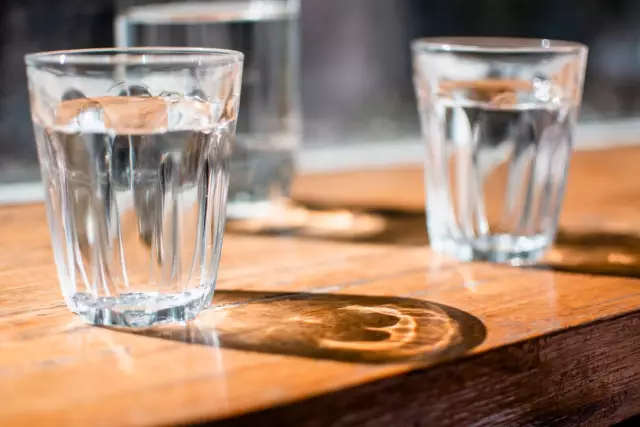- Author Rachel Wainwright wainwright@abchealthonline.com.
- Public 2023-12-15 07:39.
- Last modified 2025-11-02 20:14.
5 myths about the correct use of drinking water
It would seem that there can be no disagreements on this matter: the human body needs water for normal life, everyone knows how and when it should be drunk. It turned out that this is not entirely the case: for many years there have been very persistent errors in this area. Let's consider the most common ones.
You need to drink 2 liters of water per day
There is some truth in this statement. In any case, it is in better agreement with reality than the rather well-known recommendation to consume 1 liter for every 30 kg of body weight. Following her, a person weighing about 60 kg will feel normal, but a fat man weighing over 100 kg risks dying from water intoxication, and a girl prone to anorexia - from dehydration. On average, the result of the calculation recommended by the American Academy of Sciences is approaching 2 liters of liquid per day: at least 1 ml of water for each kilocalorie received by the body with food.
In general, the most reasonable advice seems to be to listen to the signals that a person's body gives and drink water when thirsty. However, do not forget that the consumption rate includes not only drinks, but also the liquid that a person receives every day as part of eaten meals.

Source: depositphotos.com
Reduce water intake while dieting
The most harmful delusion, fraught with very sad consequences. Any food restriction is stressful for the body. Diet, when combined with dehydration, can severely compromise health. In addition, water helps to eliminate the breakdown products of fats and proteins from the body, and when trying to lose weight, this process is activated. Therefore, it is necessary to drink a normal amount of liquid during a diet, otherwise a person runs the risk of getting intoxicated.
Many women try to drink less water for fear of swelling. This is completely ineffective: fluid retention in the tissues is not due to its excessive consumption, but due to the presence of excessive amounts of salt and hot spices in food, or due to kidney failure. A healthy person can make the meals in their diet less salty and spicy and minimize the risk of edema. And for those who suffer from diseases of the organs of the urinary system, it is not worth it at all to sit on diets intended for weight loss - it is very dangerous.

Source: depositphotos.com
Do not drink food with water
The myth that by consuming water during a meal, we make it difficult to digest food in the stomach, arose not too long ago. In fact, in the presence of liquid, food that has entered the digestive system becomes softer and more pliable and easier to process. Yes, water makes the gastric juice less concentrated, but this does not interfere with digestion, since the total amount of hydrochloric acid released remains unchanged. In addition, a significant part of the liquid very quickly leaves the stomach into the intestines and does not affect the processing of dense food. So drinking water, for example, an hour before a meal or during it, is not only not harmful, but even useful.
But one cannot but agree with the statement that you should not end your meal with a glass of compote, juice or a cup of tea. After two hot dishes and salad, the stomach is already full, the additional volume of liquid contributes to unnecessary stretching of its walls.

Source: depositphotos.com
Drinking water before bed is harmful
There are many opinions on the best time to consume water. The ban on evening drinking is most likely associated with a fear of edema, but with normal kidney function, their appearance is unlikely. General rules about when to drink water can be formulated as follows:
- during the day should be drunk as thirst appears. It is best to do this regularly, in small portions (1-2 sips at short intervals);
- It is very useful to drink a glass of water at room temperature with a few drops of lemon juice on an empty stomach. You can put a slice of lemon in water overnight, then by morning you will get an excellent vitamin infusion;
- a good option is to have a glass of herbal tea an hour before lunch. This dulls the feeling of hunger and helps to avoid overeating;
- in the hot season, it is preferable to quench your thirst with drinking or mineral water, decoction of medicinal herbs, unsweetened fruit drink or compote, cold green tea. It is necessary to drink in small sips, distributing a portion of liquid for a long time, which has a beneficial effect on the state of the ureters and kidneys;
- drinking water before bed is harmless for a healthy person.

Source: depositphotos.com
Water intake during exercise interferes with weight loss
This misconception is due to the fact that during physical exertion, the body loses part of its weight due to the increased release of water with sweat. This phenomenon has nothing to do with the process of losing weight. Exercise causes increased sweating, increased body temperature, and increased blood viscosity. Without urgent replenishment of the lost fluid, such a situation is fraught with the occurrence of blood clots and the development of a number of severe pathologies. Therefore, in no case should you limit yourself in the consumption of water during sports.
With active training, doctors recommend the following drinking regimen:
- a glass of water 1.5-2 hours before the start of classes;
- another half cup 30 minutes before training;
- during exercise - 100 ml every 15 minutes (you can be guided by the feeling of thirst and skip the next intake of water if you don't feel like drinking);
- at the end of classes - 150 ml every quarter of an hour until fluid loss is completely recovered.

Source: depositphotos.com
A lack of fluid in the body leads to severe health problems. No good intentions (the desire to lose weight, the desire to avoid edema, etc.) does not justify such a risk. A healthy person should listen to his body and drink water as thirst arises. Patients suffering from impaired renal function, diabetes mellitus and other diseases associated with impaired water-salt balance or metabolism should constantly monitor fluid intake and excretion and follow medical recommendations.
YouTube video related to the article:

Maria Kulkes Medical journalist About the author
Education: First Moscow State Medical University named after I. M. Sechenov, specialty "General Medicine".
Found a mistake in the text? Select it and press Ctrl + Enter.






